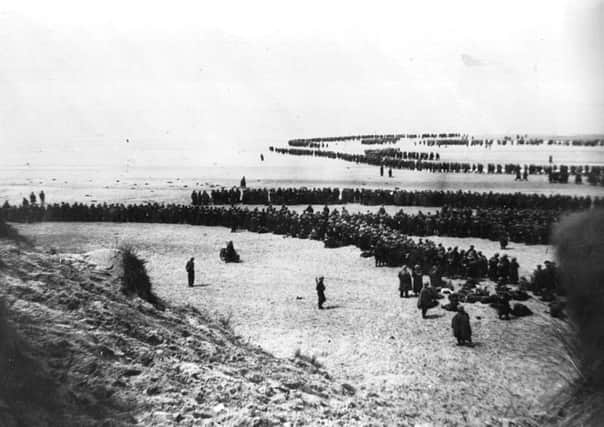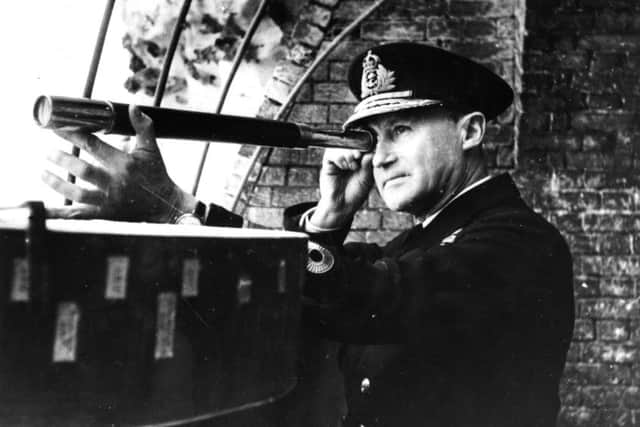Forgotten Scottish admiral who saved Britain at Dunkirk


Despite masterminding the fleet of 845 boats that brought the British Army back from France, Admiral Sir Bertram Ramsay barely merits a mention in Dunkirk, the Christopher Nolan movie currently dazzling cinema audiences with its graphic depiction of one of the turning points of the last war.
It seems an extraordinary omission given that it was Ramsay whose administrative genius saved countless lives and who was later to play a decisive role in defeating the Nazis.
Advertisement
Hide AdAdvertisement
Hide AdRamsay, a Scot descended from a proud military family, died in a plane crash in 1945 at the age of 62. His premature death robbed him of the acclaim he deserved as a pivotal figure in the Second World War.


“He was very much responsible for the Dunkirk evacuation. He organised it,” explained his son, Major General Charles Ramsay, 80.
Given less than a week’s notice, Ramsay put together his massive fleet, which included more than 500 civilian crafts including yachts, dinghies and barges. In nine days, one third of a million British and French soldiers were evacuated from Dunkirk and its environs. These men went on to form the core of experienced soldiers who were to win the war.
Three days after Dunkirk Ramsay was knighted. His stellar career continued as he went on plan the North African and Sicilian landings. And as Allied Naval Commander of D-Day, he led the largest amphibious operation the world has ever seen.
“With Montgomery, he was one of (President) Eisenhower’s deputies,” said Major General Ramsay, speaking from the Berwickshire home his father and mother bought in 1938.


“After D-Day he moved his headquarters to France. On 2 January 1945 he was flying to see Montgomery and his plane crashed. They were all killed and he never got any acclaim or rewards for D-Day. Montgomery, for instance, was made a Viscount.”
Among the family documents is a letter Ramsay wrote to his wife Margaret after D-Day had been successful.
“No doubt it is natural to congratulate the head of the concern,” he wrote. “But it only serves to remind me of the many people on whom success depended quite as much if not more than on myself. At the same time, I realise that in the event of failure it would equally be all attributed to me.”
Advertisement
Hide AdAdvertisement
Hide AdNolan’s film has focused more on the civilian heroism of Dunkirk rather than Ramsay’s formidable military planning. Ramsay’s family are phlegmatic about the lack of recognition in the film, but hope it may stimulate interest in his life.
His grandson Charlie Ramsay has seen the film and enjoyed it.
“It would have been great if our grandfather had made an appearance,” said Charlie Ramsay. “But neither he, Churchill nor any other commanders were featured, in the same way they weren’t in Saving Private Ryan regarding D-Day. So I wasn’t aggrieved. If other commanders had been featured but not our grandfather, then I might have been. This opinion of course does not diminish my pride in what he achieved.”
Ramsay also earned the respect of his military contemporaries. Lord Gort – the commander of the British Expeditionary Force – later wrote to him: “We can only say thank you and in doing so we will never forget an achievement that will live forever in the annals of the sea.”
Another grandson, Will Ramsay, described his premature death as a “terrible tragedy” for the family.
“It was also a cruel curtailment of a great leader’s life,” he said. “Eisenhower called him ‘a most competent commander of courage, resourcefulness and tremendous energy’. He paid him the ultimate tribute by saying that only he could have organised such a large-scale landing.
“Some years ago David Eisenhower (the late President’s grandson) told my uncle David that after his grandfather had retired as President, Freeman Gosden – a well-known actor of those days – asked him at a dinner party if he would name the ten most impressive men he had met during his career. Apparently he had no hesitation in including my grandfather as one of those ten.”
But perhaps the most eloquent tribute to Ramsay came in the form of a letter sent to him by the wife of a soldier who had been evacuated at Dunkirk.
“Even if you had time, please do not answer this, but I felt I must thank you for rescuing my old boy,” she wrote.